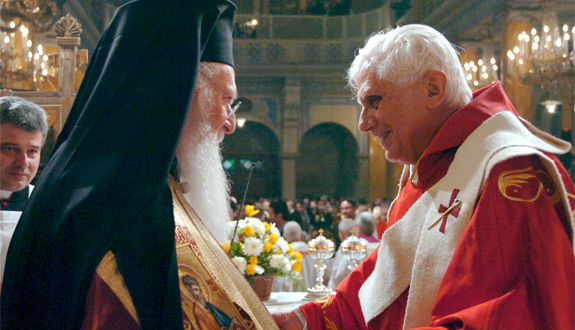The Catholic Church and the Orthodox are now separated by more than a thousand years. In an effort to distinguish between Catholicism and Orthodoxy, many, especially on the part of the orthodox doctrine, they used the terms Pope, or even Purgatory, to show the differences between the two. however, there are many differences, and most are significant.
To explain the concept of faith in orthodoxy, science and philosophy are used. The Catholic Church gives much evidence and importance to human reason, to make faith and science consistent. The Orthodox Church, on the other hand, it does not seek to reconcile human reason and faith, but argues that the discoveries of science or philosophy, they shed light or provide support, to the teachings of Christ.
Catholic doctrine believes in the theory of doctrinal development, in which there is the belief that Christ's teachings change over time. The Catholic Church believes that Christ has only "planted" an original seed of faith, which then grew and matured over the centuries. When the church encounters new situations, Christian faith is made stronger by the Holy Spirit e, then, further revelations and doctrines are needed. Even if Orthodoxy recognizes the "changes" to the doctrine over time, non adds O subtracts nothing to his faith to meet the new needs that are encountered over time.
As for the proof of God's existence and his divine being, Orthodoxy teaches that the knowledge of God is planted in human nature, and this is how human beings come to understand that He exists. Human reason can never understand more than what it sees, since he has a limited mind, unless God "speaks to men". This contrasts enormously with the Catholic teaching of God, who affirms that the eternal existence of the Almighty can be demonstrated by human reason. Catholics believe that God is the most real being of all, and that human beings bear a resemblance to him, except we are imperfect.
the orthodox church does not recognize, among the others, the doctrines concerning the papal primacy, purgatory and the procession of the Holy Spirit from the Son.
The Orthodox Church practices baptism by immersion, offers the Eucharist to the faithful with leavened bread and wine and does not oblige priests to be celibate.
![2037benedictbar_00000001200[1]](https://www.veritadellabibbia.net/wp-content/uploads/2015/06/2037benedictbar_000000012001.jpg)
As for the mystery, both doctrines recognize at least seven sacraments, Confirmation, Penance, Ordering, Marriage, Baptism, the Eucharist and the Anointing of the Sick. Although, in general, Orthodoxy teaches that matter is filled with grace through the call of the Holy Spirit, for Catholics, the efficacy of the sacraments is found in the priest, acting "in the person of Christ". Furthermore, the Catholic interpretation of the sacraments is legal and philosophical.
As for marriage, in Orthodoxy it is not a binding contract, as in Catholicism. The Orthodox take marriage as a saint as an imitation of the bond between the Church and Christ, witnessed by all the people of God through the presbyter. Even if divorce is not allowed, it is permitted in cases of adultery. On the other hand, Catholics do not allow divorce under any circumstances, and the marriage contract binds man and woman to the church. Only if you had to (it's rare) find some flaw in it, can be made null, as if it never happened.
Summary
- Catholicism uses human reason to explain the concept of faith, while Orthodoxy does not reconcile human reason with faith.
- Catholic doctrine, it evolves as it changes over time, and must adapt to the prevailing circumstances, while Orthodoxy does not change its doctrine by adapting it to situational needs.
- The Orthodox do not recognize papal primacy, the doctrine of purgatory, ecclesiastical celibacy, they practice baptism by immersion and give bread to all (leavened) and wine during the rite of the Eucharist.
- In holy marriage, for Catholics, divorce is not allowed under any circumstances, while for Orthodox, it can be granted when adultery has been committed.
- Catholics believe that human reason can prove the existence of God, while the Orthodox believe that the knowledge of God is planted in human nature.



